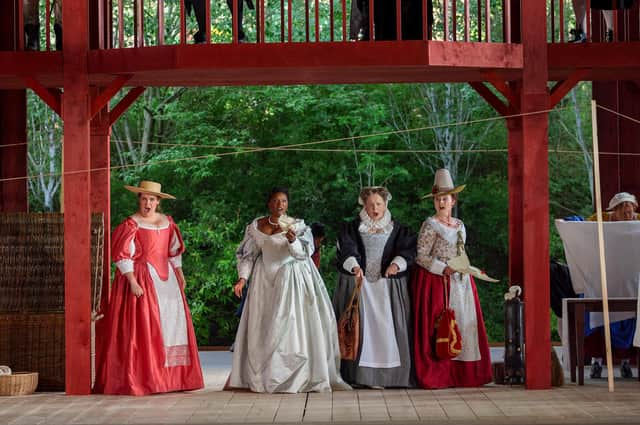Opera review: Scottish Opera's Falstaff, 40 Edington Street, Glasgow


Scottish Opera: Falstaff, 40 Edington Street, Glasgow *****
By his own admission, Sir David McVicar’s previous attempt at directing Verdi’s final opera Falstaff didn’t hit the spot. He needn’t worry this time round, for the Scots-born opera director/designer has nailed it in a new production for Scottish Opera – shared with Santa Fe Opera – that is running this month in Glasgow and next month (8-14 August) at the Edinburgh International Festival.
Like last September’s La Bohème, this initial leg in the run is taking place in the car park at Scottish Opera’s production studios with the socially-distanced audience sheltered under a solid open-sided gazebo-like structure. Yes, it was breezy the night I attended, but so is this busy, brisk and fluid production.
Advertisement
Hide AdAdvertisement
Hide AdMcVicar transposes Verdi’s fast-flowing final opera to the Jacobean Age, so Sir John Falstaff – the fat and pompous freeloading knight – plies his libidinous and deluded charm carelessly in a climate of post-Elizabethan puritanism. That simple time shift – sung in a slick English translation by Amanda Holden – throws a tantalising hint of menace over the essentially comedic plot.
And McVicar’s cast go with it all the way. Central to everything is Roland Wood’s ubiquitous Falstaff, played with ageing bluster and a sort of middle management abuse of power in the mould of Rowan Atkinson’s Blackadder, with competing Baldrics – Jamie MacDougall”s entertaining, idiot teuchter-style Bardolph and Alistair Miles’ more strait-laced sidekick Pistol – to do, or undo, his dirty work.
Wood proves himself a prize Verdian hero-victim, layers of pathos and vulnerability underpinning the waning swagger, and that instantaneous capitulation when he realises he’s been had – by then a world away from his cavorting opening entrance with his latest wench aboard a mobile double bed.
But this is a triumph of teamwork, not least from a dynamic female cast whose connivances are the engine room of Falstaff’s debunking. Elizabeth Llewellyn is a magnetic presence as Alice Ford, vocally voluptuous and gently magisterial in character, with Sioned Gwen Davies’s Meg Page – the other target of Falstaff’s macho game – a more delicate foil.
There’s a chirpy matronliness in Louise Winter’s Mistress Quickly, deceptively devious, with Gemma Summerfield’s sweetly sung Nannetta providing the captivating freshness of youth, lightly flirtatious, quietly determined. Her romantic coupling with Fenton, ardently characterised by Elgan Llÿr Thomas, is the true-love contrast to Falstaff’s serial lust. Also among the men, and the criss-cross confusion of intrigues that keep them busy, are Phillip Rhodes’ underhand, over-proud Ford and Aled Hall’s thwarted Dr Caius.
Andrew George’s choreography is a mastery of manipulation. There’s never a moment in this hurtling production where the eye is bored. The multi-tiered set, linked by a maze of symmetrical staircases, is non-specific enough to counter its static presence. The option to open the rear stage doors and utilise the outdoor shrubbery is a visual masterstroke, which comes into its own in the closing masquerade.
The ultimate winner is Verdi’s quicksilver score, more extraordinary for the fact that music director Stuart Stratford’s fully-engaged orchestra plays from an adjacent studio building, broadcast live into the auditorium space.
Advertisement
Hide AdAdvertisement
Hide AdYet this Falstaff has still much more to offer. Next month’s Festival run will see opera in Scotland move a step closer to normal, with indoor performances of this production at Edinburgh Festival Theatre. That will require a certain amount of adaptation of the staging, but more importantly bring the entire cast, chorus and orchestra together as a single force. If anything is guaranteed to celebrate this moment with optimistic zeal, it’s this Falstaff.
Scottish Opera’s Falstaff is in Glasgow until 7 July, www.scottishopera.org.uk; then at Edinburgh Festival Theatre from 8-14 August, www.eif.co.uk
A message from the Editor
Thank you for reading this article. We're more reliant on your support than ever as the shift in consumer habits brought about by coronavirus impacts our advertisers.
If you haven't already, please consider supporting our trusted, fact-checked journalism by taking out a digital subscription at https://www.scotsman.com/subscriptions